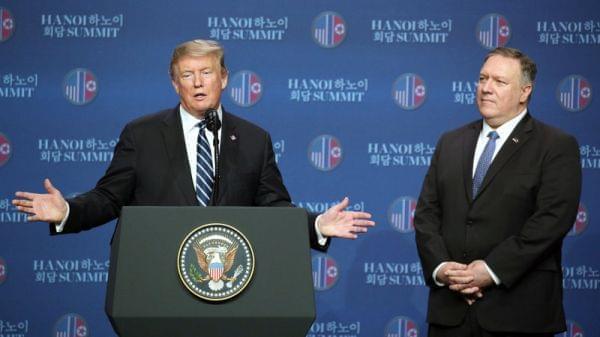Trump And Kim’s Second Nuclear Summit Ends With No Deal

U.S. President Donald Trump, left, gestures as Mike Pompeo, U.S. secretary of state, looks on during a news conference following the DPRK-USA Hanoi Summit in Hanoi, on Thursday. Trump's second summit with Kim collapsed Thursday without an agreement between the two leaders. Bloomberg/Bloomberg via Getty Images
President Trump and North Korean leader Kim Jong Un left their summit meeting on Thursday in Hanoi, Vietnam, without agreeing on a denuclearization deal. A planned signing ceremony was canceled.
The biggest sticking point was sanctions against North Korea, Trump said at a press conference Thursday afternoon local time. Kim is "totally" willing to dismantle nuclear weapons in key areas, such as the Yongbyon nuclear facility, but the North Korean leader wants all sanctions removed first, Trump said. "We couldn't do that."
Unable to come to an agreement, the two leaders decided to end the summit early. "Sometimes you have to walk, and this was just one of those times," Trump said.
"When we walked away, it was a very friendly walk," Trump said, characterizing the meeting between the two leaders as one filled with "warmth." There are currently no plans for future meetings, but Trump said he looks forward to the next one, whenever that may be. "I would hope it would be soon, but it may not be for a long time."

President Donald Trump meets North Korean leader Kim Jong Un, Thursday, Feb. 28, 2019, in Hanoi. No deal was reached.
Trump could have signed a deal with North Korea, but neither he nor Secretary of State Mike Pompeo would have been happy with it, he said. "I could have 100% signed something today. We actually had papers ready to be signed. But it just wasn't appropriate. I want to do it right. I'd much rather do it right than do it fast."
Pompeo said the U.S. had asked Kim to "do more," but he was "unprepared to do that." It's a "very complex problem" that will take time, Pompeo said. They now know what some of the limits and challenges are, and he hopes that they could ultimately achieve denuclearization of the Korean peninsula, which he said is "what the world wants."
Pompeo echoed Trump's optimism. "We are certainly closer today than we were 36 hours ago, and we were closer then than we were a month or two before that," he said.
I want to do it right. I'd much rather do it right than do it fast."President Donald Trump
Also during the press conference, Trump criticized Congress for holding what he called a "fake hearing" with Michael Cohen while Trump was in the middle of a summit with Kim. Cohen called Trump a "racist" and a "con man" and detailed a litany of alleged wrongdoing by the president. Cohen stopped short of alleging coordination with Russia to win the 2016 presidential election — a fact Trump mentioned at the press conference, noting there was "no collusion" with Russia.
Trump and Kim "had very good and constructive meetings," press secretary Sarah Sanders said in a statement. "The two leaders discussed various ways to advance denuclearization and economic driven concepts." However, she said, "no agreement was reached at this time."
The signing ceremony was called off with less than two hours to go. After the news conference finished, Trump said he was headed back to Washington.
Before the summit, Trump said he had been optimistic that some agreement with North Korea could be reached, even if it didn't lead to immediate plans for denuclearization.
According to The Hill, the "lack of any tangible results is sure to give fodder to critics who have accused Trump of holding summits with Kim that are nothing more than photo [ops] that boosts the legitimacy of the North Korean dictator."
The Washington Post called the turn of events "a diplomatic failure."
Earlier, the two leaders had expressed optimism about reaching a deal over nuclear arms. Asked by a reporter if he was willing to "denuclearize," Kim said, "If I'm not willing to do that, I wouldn't be here right now."
NPR's Seoul Correspondent Anthony Kuhn says South Korea was caught off guard by the collapse of the talks, as President Moon Jae-in was prepared to deliver a speech on burgeoning peace on the Korean peninsula. Stock markets in South Korea and Vietnam also plunged on the failure of the summit to reach an agreement.
Links
- President Trump’s State Of The Union Address, Annotated
- Trade Disputes Explode Under Trump Tariff War
- At Summit, An Upbeat Trump Praises Kim’s Commitment To Denuclearize
- Trump National Security Adviser H.R. McMaster To Resign, Be Replaced By John Bolton
- Trump Replaces Sec. Of State Tillerson With CIA Director Pompeo

